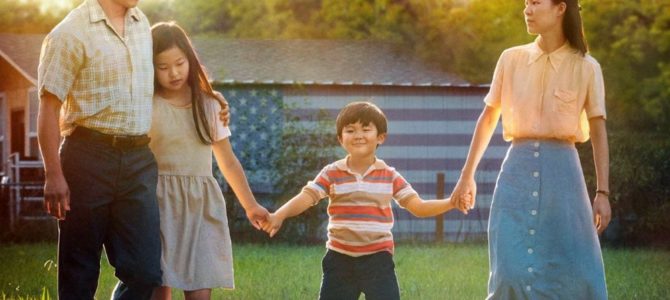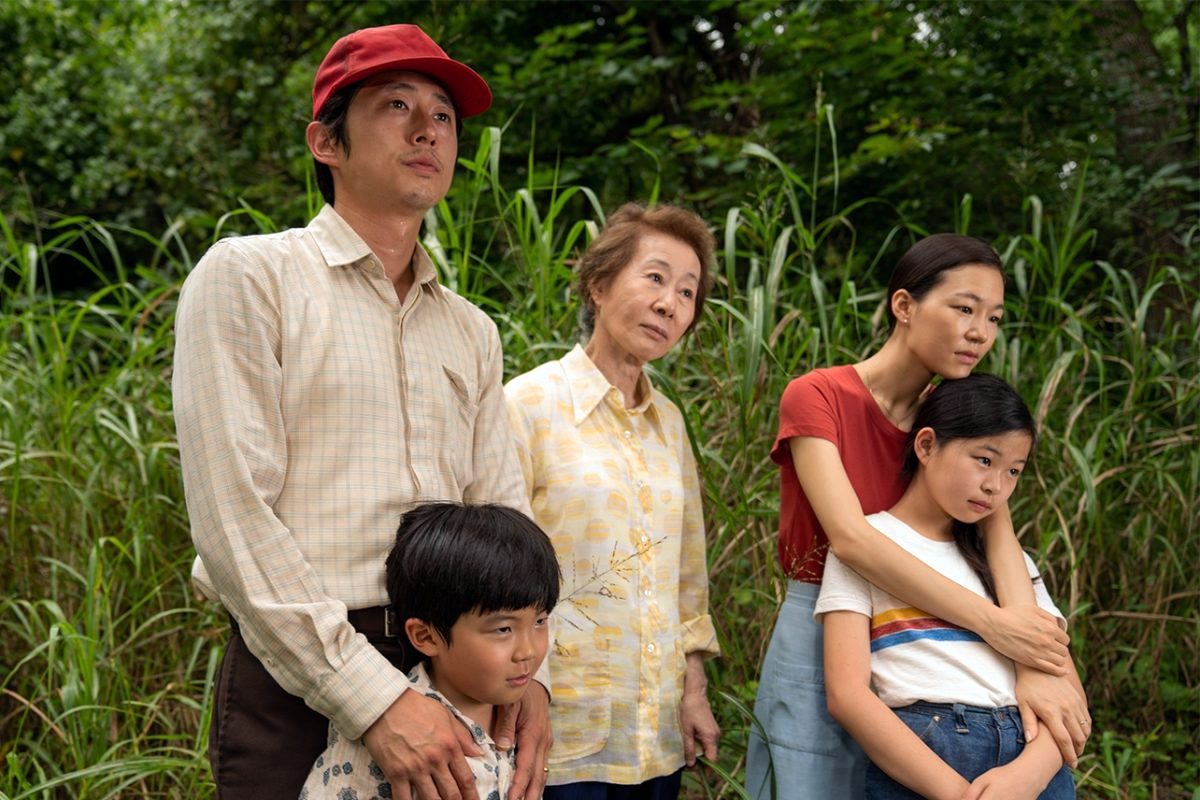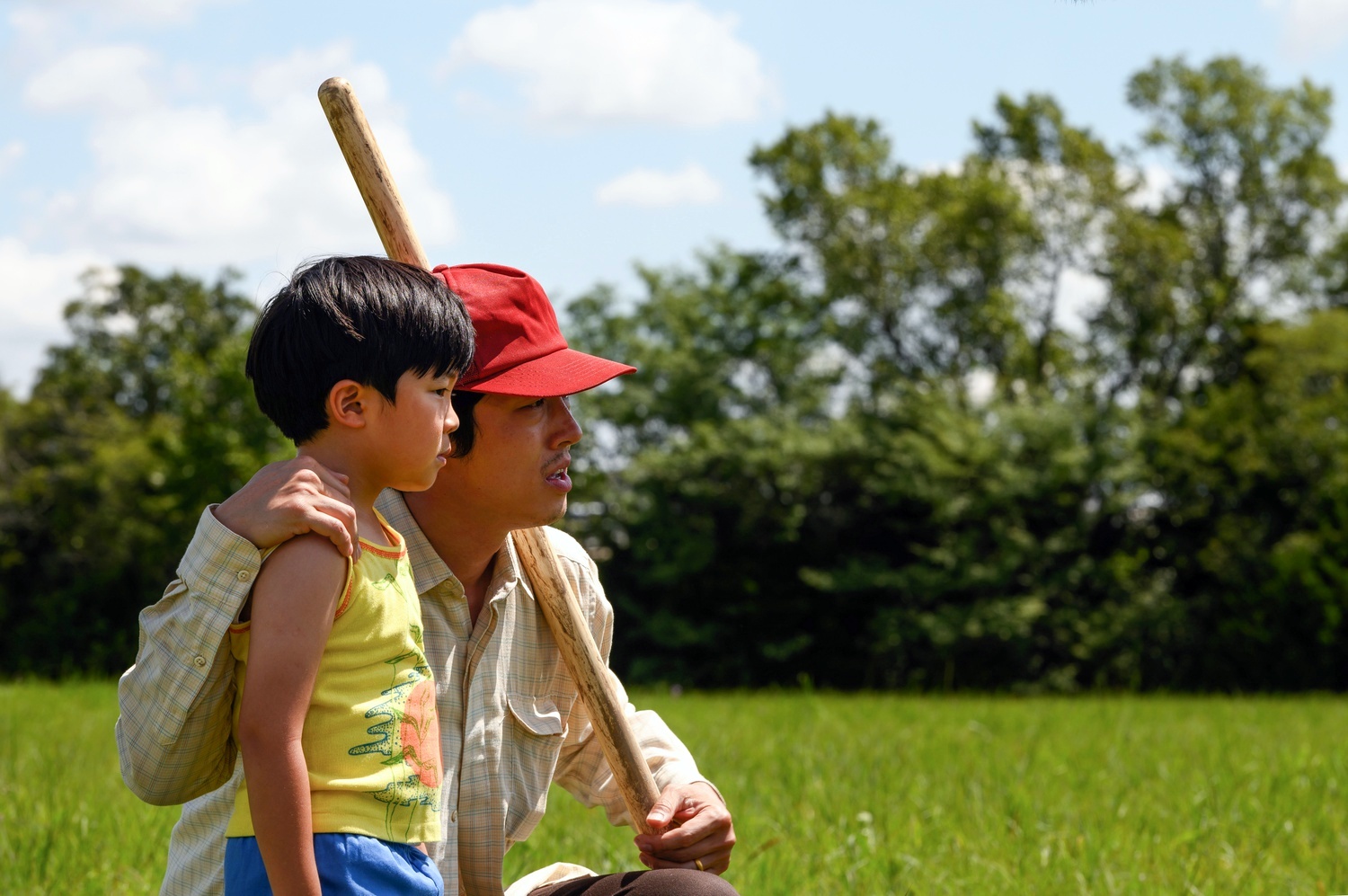
After five decades on-screen, 73-year-old actress Yuh-Jung Youn has been winning global accolades this year. In “Minari,” released Friday via on-demand platforms, she co-stars as a no-nonsense grandmother — not unlike herself — in the story of an immigrant family that moves to Arkansas to pursue the American dream.
Youn demurs when asked how the film speaks to current events. “I’m sure everybody has a different opinion,” she told me in an interview. “Always when I have a premiere in [South] Korea, they ask: ‘What message should we get from this movie?’ But I’m not some kind of crusader! If people feel something or are moved by this movie, I’ll be very grateful.”
Writer-director Lee Isaac Chung loosely based the story on his childhood, when English and Korean were spoken interchangeably at home. In the mid-1980s, his father (fictionalized as Jacob in the film) bought a plot of land in Lincoln, Ark. aiming to raise a farm — and a better life for his family.
His wife Monica isn’t so convinced their sacrifices will be successful. Their children, seven-year-old David and older sister Anne, are alternately diverted by and complaining about their unfamiliar new home.
Awards buzz for “Minari” has come in part due to what many consider to be a snub. The Golden Globe Awards, to be telecast on Sunday night, nominated it in their Best Foreign Language Film category. Yet that association did not consider it for Best Film, despite being shot in Oklahoma by an Asian-American filmmaker. Insiders await Oscar nominations on March 15 to see if it fares better with the Academy.
Comparisons to recent hit movies produced by east Asian filmmakers, such as last year’s Best Picture winner “Parasite,” may be inevitable. Regardless of awards or box office, “Minari” tells an American story with family relationships and abiding Christian faith at its center.
Such authenticity convinced Youn, a household name in South Korea, to co-star in an American movie for the first time in her 55-year acting career. “I agreed to the part once I knew it was based on real-life,” she said. “I can see my neighbors and myself in it. The script felt very real.”
Feisty Family Dynamics
“Minari” draws viewers in with outrageous characters who round out the ensemble.
Newly arrived from overseas, foul-mouthed grandmother Soonja (played by Youn) teaches her grandkids go-stop, a Korean version of poker, and clashes with her devout daughter. Then their kind — and kind-of strange — neighbor Paul enters the picture. Once the farm requires help, Jacob hires the vocally prayerful Pentecostal Christian who wears faith on his sleeve.
Grounding the story in his own memories, director Chung cultivates nuance rather than one-note comic relief. “I had the luxury of knowing people like this, just as a part of my life,” he said. “That gave me the freedom to focus on mining what makes them tick. I wanted to create people who are fully alive, people who invite you to discover more and more about them.”

The parents’ economic and marital struggles drive much of the plot — Jacob resolves their farm must succeed, while Monica resents their menial work in a chicken plant. Yet the dynamic between grandmother and grandson emerges as a key conflict. Young David (seven-year-old Alan Kim, in his first role) has to share a room with elderly Soonja, and childish pranks ensue.
When David tests boundaries, Youn’s character balances tough love and friendship — not too far from her real-life role with her two adult sons and grandson. “To know the similarities, maybe you have to ask my grandson, not me!” she told me. “In their hearts, all grandmas love their grandsons. That’s universal.”
Growing Across Lines of Faith and Culture
As to the charismatic Christian neighbor, the actress relates to him as well. Although peculiar in his spiritual spontaneity, the neighbor’s persistent friendship uplifts the immigrant family. “I’ve known many people like that. To me, the film is not judging their religion.”
During the 1970s, Youn’s former husband served with evangelist Billy Graham’s ministry. They lived in St. Petersburg, Fla., where their two sons were born. As members of Northside Baptist Church, they stood out in the congregation of more than 2,000 people.
“During nine years in that Southern Baptist Church, we were the only Asian people,” she said. “But they were very friendly and curious about us. Maybe I am not that sensitive, but I didn’t feel any discrimination. In conversation about meals, one said: ‘Wow, you really eat that!?’ Well, you eat very strange things too. I think we are all really the same.”

In the film, scenes show her grandson interacting with American kids at church, who comment on his features. “They’re just curious about him looking different,” she said. “They’ve only seen similar people. That’s the beauty about Isaac’s point of view in this movie.”
Chung reflects on how “Minari” depicts cross-cultural stumbles, an honest take on ethnic and racial discrimination. “The thing I most wanted was to let people into this family’s world with sincerity and honesty — without judgment of anyone in it. There’s so much more drawing us together as human beings than the superficial categories we have created.”
Finding Home and Healing
The film gets its name from a peppery Korean herb. When grandmother Soonja plants minari near a forest river, at first there is no visible evidence that it takes to the American soil. By the end, it plays a striking role in the fictional family’s story.
Having often enjoyed the herb, Youn now sees it in a new light. “It has a special fragrance,” she said. “When you get older, you eat minari with soup or as a side itself. The young may try it but most don’t eat it because they don’t appreciate it. I didn’t realize it has such meaning, which is knowledge I learned from Isaac.”
Chung sees it as a metaphor: “Minari comes in the pockets of immigrants, dies in the first year, thrives in the second, and purifies the water and the soil around it.”
Following several disasters on the family farm, natural and otherwise, the finale of “Minari” shows people from different backgrounds building lives together. “I hope this film can offer some healing moments, especially to people who have been hurt by discrimination,” said Youn. “The ending scenes are about [finding] conciliation between Western and Eastern worlds.”
In addition to Youn’s standout role, actor Steven Yeun — who starred for seven seasons on the hit TV series “The Walking Dead” — has received praise for his portrayal of caring, conflicted father Jacob. Devoid of violence or sexual content, this intimate family drama contrasts starkly with most current awards contenders in Hollywood.
Youn brushes off any suggestion of appearing at the Oscars. “Oh, goodness, no! I’ll be surprised if so.”
A story about where we come from, and where we choose to grow. Beginning this weekend, you can watch Lee Isaac Chung’s #Minari everywhere you rent movies. 🌱 pic.twitter.com/HP9skCJkla
— Minari (@MinariMovie) February 23, 2021
Rated PG-13 for some thematic elements and brief language, “Minari” is now available to stream via various on-demand platforms.









